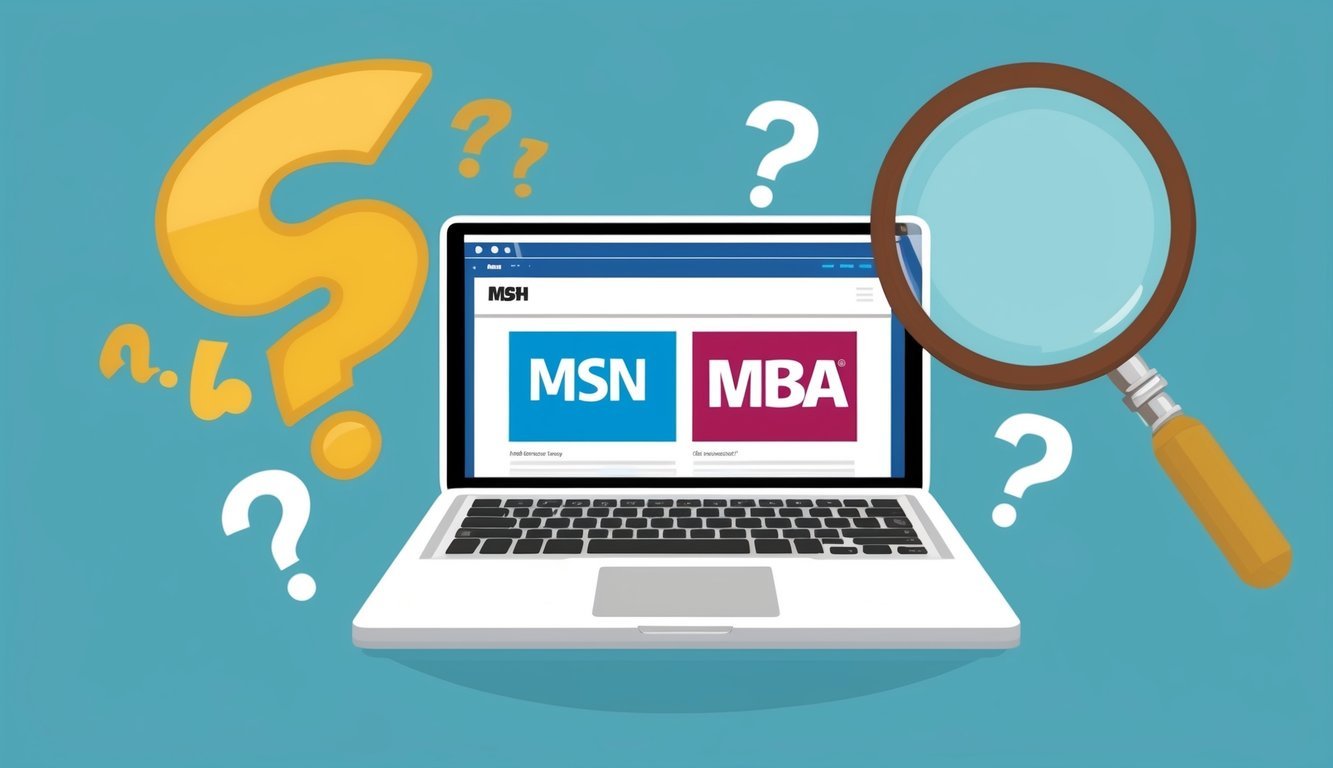Choosing between a Master of Science in Nursing (MSN) and a Master of Business Administration (MBA) can be challenging, especially in the healthcare field. The right degree depends on your career goals and interests: an MSN focuses more on clinical practice and nursing leadership, while an MBA prepares you for the business side of healthcare.
If you aim to enhance patient care and take on advanced nursing roles, the MSN is ideal.
Conversely, if your goal is to manage healthcare organizations and understand healthcare economics, the MBA is a better fit.
Both degrees offer valuable skills and can lead to rewarding careers.
You may also consider a dual degree, combining the strengths of both MSN and MBA programs.
This path can open doors to diverse leadership roles in healthcare settings, equipping you with clinical expertise alongside business acumen.
Key Takeaways
- An MSN prepares you for advanced nursing roles focusing on patient care.
- An MBA equips you with knowledge for managing healthcare organizations.
- A dual degree offers benefits from both degrees, enhancing career opportunities.
Comparing MSN and MBA Paths
When choosing between an MSN (Master of Science in Nursing) and an MBA (Master of Business Administration), it’s important to consider each degree’s focus and the career paths they lead to.
Both degrees offer advanced education but cater to different professional goals.
Core Focus and Curriculum
The MSN program focuses on nursing education and clinical practice.
You’ll gain in-depth knowledge about patient care, healthcare policy, and advanced nursing techniques.
Many MSN programs also offer specializations, allowing you to concentrate on areas like midwifery or nurse anesthesia.
In contrast, the MBA centers on business administration and management principles.
The curriculum typically covers finance, marketing, and organizational behavior.
You’ll learn how to manage resources and lead teams effectively.
A dual degree option, such as an MSN/MBA, can combine these two areas, giving you a broader skill set.
| Degree | Core Focus | Typical Coursework |
|---|---|---|
| MSN | Nursing | Advanced Practice, Healthcare Leadership, Clinical Specialization |
| MBA | Business | Financial Management, Marketing Strategies, Organizational Behavior |
Career Outcomes and Prospects
With an MSN, you can pursue roles as a Nurse Practitioner, clinical nurse leader, or healthcare educator.
These positions often involve direct patient care and leadership within healthcare settings.
The demand for advanced practice registered nurses is growing, resulting in strong job security.
Alternatively, an MBA prepares you for positions in management and administration.
You could work as a healthcare manager, business analyst, or administrator in various sectors.
The skills learned in an MBA can be applied to improve organizational performance and patient outcomes in healthcare.
| Career | Degree Required | Job Growth Rate |
|---|---|---|
| Nurse Practitioner | MSN | 45% over 10 years |
| Healthcare Manager | MBA | 32% over 10 years |
Key Benefits of Pursuing an MSN

An MSN degree offers significant advantages for nurses aiming for leadership roles and clinical advancements.
You can expect to enhance your skills in managing teams, improving patient care, and integrating informatics in healthcare settings.
Roles in Nursing Leadership
With an MSN, you can step into nursing leadership positions that require advanced skills.
Your education prepares you to take on roles such as Nurse Manager, Clinical Director, or Nurse Educator.
These positions often involve leading teams, developing policies, and improving healthcare practices.
You will learn to implement evidence-based practices, enhancing the quality of care provided.
Moreover, an MSN equips you with the tools to train new nurses and mentor peers, fostering a culture of continuous improvement within your organization.
Your expertise in leadership can make a significant difference in patient care and team effectiveness.
Clinical Advancements and Patient Outcomes
Obtaining an MSN allows you to delve deeper into clinical settings.
You gain the clinical experience necessary to diagnose and manage patient care independently.
This advanced education can lead to roles such as Nurse Practitioner or Clinical Nurse Specialist.
In these roles, you will have the authority to prescribe medications and create treatment plans, directly impacting patient outcomes.
Furthermore, your understanding of informatics will enable you to leverage technology in patient care.
You will be able to analyze data and implement strategies to improve care efficiency and effectiveness.
This skill set can ultimately lead to better health outcomes for patients and enhanced operational performance in healthcare organizations.
Advantages of Earning an MBA in Healthcare

Earning an MBA in Healthcare offers numerous benefits that can enhance your career.
This degree equips you with essential skills for navigating the complexities of the healthcare system.
You will gain insights into business strategy and leadership roles within the healthcare sector.
Business Strategy in Healthcare
An MBA program focusing on healthcare prepares you for strategic decision-making.
You learn how to analyze market trends and develop business plans tailored to the healthcare setting.
Understanding Healthcare Management is crucial as it involves planning and controlling resources to improve patient care.
Key topics include:
- Financial Management: Learn budgeting and funding strategies to optimize resources.
- Operations Management: Discover how to improve efficiency in healthcare delivery.
- Healthcare Policy: Understand laws and regulations affecting the industry.
These skills enable you to contribute to innovative solutions within your organization and adapt to changing environments.
Healthcare Administration and Executive Positions
An MBA can open doors to significant administrative and leadership roles.
Positions such as healthcare administrator or executive director are attainable with this qualification.
These roles require a solid grasp of both business principles and healthcare operations.
In these positions, you are responsible for:
- Managing Healthcare Facilities: Oversee daily operations and compliance.
- Leading Teams: Inspire and guide multidisciplinary teams towards common goals.
- Strategizing Growth: Develop programs that meet community health needs and advance organizational goals.
Overview of MSN/MBA Dual Degree Program

The MSN/MBA Dual Degree Program combines advanced nursing education with business management training.
This partnership helps prepare you for leadership roles that require both clinical and administrative expertise, making you a valuable asset in healthcare settings.
Accreditation and Admission Requirements
To enroll in an MSN/MBA Dual Degree Program, you need to meet specific accreditation and admission criteria.
Universities offering these programs typically require a Bachelor of Science in Nursing (BSN) and a valid Registered Nurse (RN) license.
Most programs also seek candidates with a minimum GPA and may require standardized test scores such as the GRE.
It is important to check if the program is accredited by recognized organizations, which impacts the quality of education and your eligibility for federal financial aid.
Accreditation ensures that your degree meets industry standards and enhances your job prospects as a nurse administrator.
Curriculum Structure and Learning Outcomes
The curriculum for the MSN/MBA Dual Degree combines core nursing courses with business administration classes.
You will cover areas such as advanced nursing practices, healthcare economics, and organizational behavior.
Typically, the program includes:
- Nursing Leadership
- Healthcare Policy
- Financial Management in Healthcare
Completing this program equips you with skills to address both clinical challenges and business management issues.
Graduates often pursue careers as nurse administrators, helping healthcare organizations improve patient care and operational efficiency.
This dual degree enhances your qualifications, making you competitive in a diverse job market.
Career Pathways with an MSN or MBA
Pursuing an MSN or an MBA can open doors to various career opportunities in the healthcare sector.
Each degree equips you with unique skills that cater to different roles, impacting your career growth and potential earnings.
Career Growth and Opportunities
With an MSN, you can advance into clinical roles or management positions.
As a Nurse Manager, you would oversee nursing staff and ensure patient care standards are met.
An MSN can also lead to roles like Chief Nursing Officer (CNO), where you guide nursing practices across health organizations.
An MBA focuses more on the business side of healthcare.
You can aim for positions like Healthcare Manager or Hospital Administrator, overseeing operations, budgets, and staff management.
This degree can also facilitate roles in healthcare consulting, allowing you to influence policy and strategy on a larger scale.
| Degree | Potential Roles |
|---|---|
| MSN | Nurse Manager, CNO |
| MBA | Healthcare Manager, Hospital Administrator |
Earnings Potential and Job Market Outlook
The earning potential varies based on your chosen degree and role.
According to recent data, Nurse Managers with an MSN typically earn between $90,000 and $120,000 annually. CNOs can earn even more, often exceeding $150,000.
In contrast, those holding an MBA in healthcare can expect similar, if not higher, earning ranges. Healthcare Managers often have salaries starting at $85,000, with Hospital Administrators averaging around $100,000.
| Role | Average Salary Range |
|---|---|
| Nurse Manager | $90,000 – $120,000 |
| Chief Nursing Officer | $150,000+ |
| Healthcare Manager | $85,000+ |
| Hospital Administrator | $100,000+ |
The job market for both paths remains strong, with a growing need for skilled professionals in healthcare management and clinical leadership.
As you consider your options, it’s essential to weigh the specific benefits of each degree against your career goals.
Frequently Asked Questions

This section addresses common questions regarding the differences between MSN and MBA degrees.
It covers career prospects, salary potential, dual degree structures, and the unique advantages each degree offers in the healthcare field.
What are the career prospects after completing an MSN versus an MBA?
After earning an MSN, you may advance to roles such as Nurse Practitioner, Clinical Nurse Specialist, or Nursing Educator.
These positions allow for a focus on patient care and specialized nursing fields.
With an MBA, you can pursue positions in healthcare administration, management, or consultancy.
Roles may include Healthcare Manager or Director of Nursing, focusing more on the business side of healthcare.
How does the salary potential compare between MSN and MBA graduates?
Salaries for MSN graduates can vary.
For instance, Nurse Practitioners often earn between $100,000 and $120,000 annually.
Meanwhile, clinical roles usually come with competitive pay, reflecting the advanced skills required.
MBA graduates typically see salaries ranging from $80,000 to $150,000, depending on the role and experience.
Healthcare management positions often attract higher pay due to business expertise and leadership responsibilities.
What is the structure and advantage of an MSN/MBA dual degree program?
An MSN/MBA dual degree program combines nursing with business education.
Typically, it requires 3-4 years of study.
This program equips you with advanced clinical skills and business acumen, making you valuable in various healthcare settings.
You will study nursing core classes and business management.
Graduating with this dual degree can lead to diverse career opportunities and versatile roles in healthcare.
In the context of healthcare administration, how is an MBA degree beneficial for nurses?
An MBA provides nurses with essential skills in finance, management, and organizational behavior.
This knowledge is crucial for navigating the complex healthcare environment.
With an MBA, you can effectively lead teams, manage budgets, and implement healthcare policies.
This background enhances your ability to influence patient care delivery from a business perspective.
How does the value of a Master’s degree in nursing differ from the value of an MBA?
An MSN primarily focuses on clinical expertise and specialized nursing practice.
It prepares you for advanced patient care roles and specialized nursing fields.
In contrast, an MBA emphasizes business strategies, leadership, and operational management.
This degree is valuable for those looking to move into administrative or management roles within healthcare settings.
Are there significant differences in job roles between MSN and MBA degree holders?
Yes, there are notable differences. MSN holders typically work in clinical settings, focusing on patient care and nursing practice.
On the other hand, MBA holders often occupy management or administrative roles.
They focus on policy-making and the operational aspects of healthcare.
These distinct roles reflect the differing emphases of each degree.

